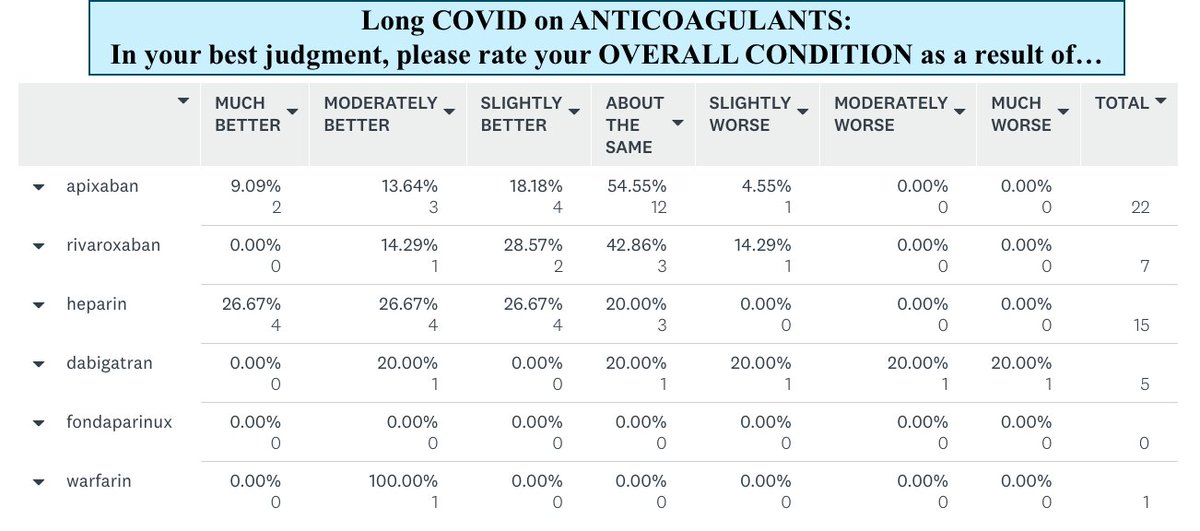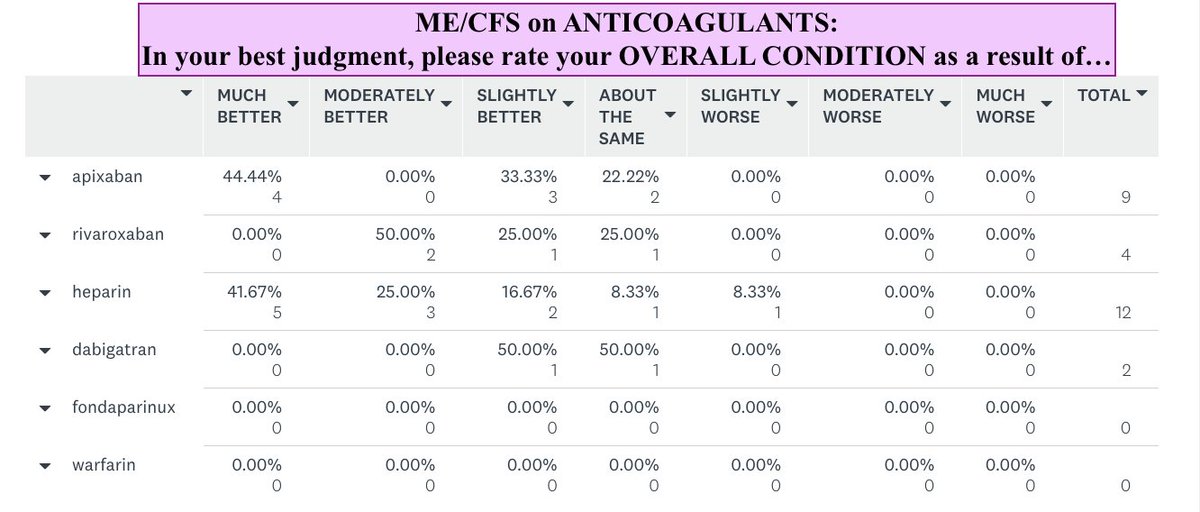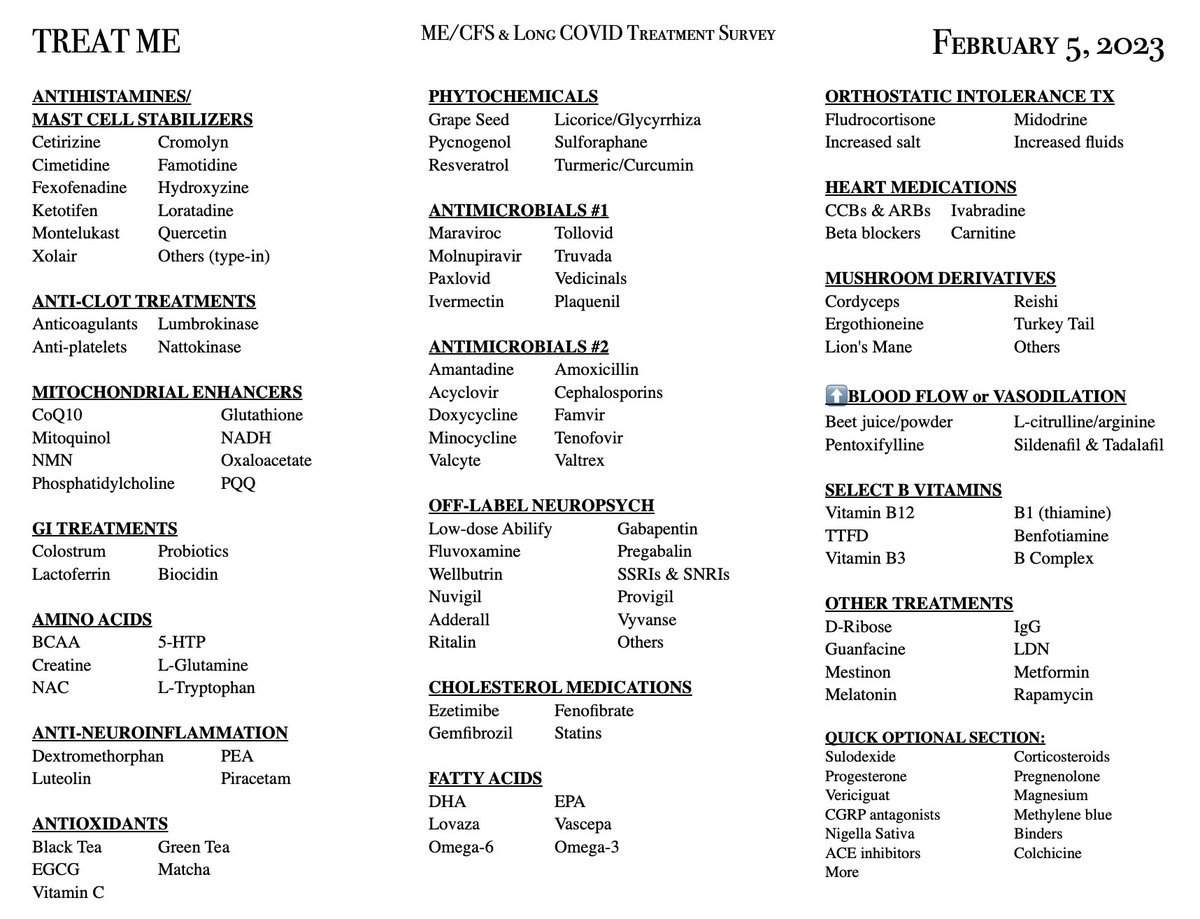Linked are articles #1 & 2 in a series of many detailing individual treatment results from #TREATME survey. At a later date, a comprehensive overview & analysis of pertinent data will be shared.🧵
#1: NK, LK, SP
pharmd.substack.com/p/treat-me-sur…
#2: Immunoglobulin
pharmd.substack.com/p/treat-me-sur…
#1: NK, LK, SP
pharmd.substack.com/p/treat-me-sur…
#2: Immunoglobulin
pharmd.substack.com/p/treat-me-sur…
OVERALL CONDITION
Over 81% on SCIG (n = 11) & 72% on IVIG (n=29) reported their overall condition improved. Strikingly, >52% reported feeling moderately to much better w/ >27% of the 38 respondents feeling “much better.” This is significantly better than most other surveyed txs!

Over 81% on SCIG (n = 11) & 72% on IVIG (n=29) reported their overall condition improved. Strikingly, >52% reported feeling moderately to much better w/ >27% of the 38 respondents feeling “much better.” This is significantly better than most other surveyed txs!


TIME TO IMPROVEMENT
Responses varied substantially. 9 out of 25 (36%) respondents reported it took just 1 to 2 rounds of therapy before starting to feel better, while on the other extreme, 8 out of 25 (32%) respondents reported that over 10 rounds of IgG were required.
Responses varied substantially. 9 out of 25 (36%) respondents reported it took just 1 to 2 rounds of therapy before starting to feel better, while on the other extreme, 8 out of 25 (32%) respondents reported that over 10 rounds of IgG were required.

DURATION OF BENEFIT
Respondents who improved were asked how long they have benefited from IgG. Over 80% reported benefits lasting at least 6 months, with over 50% enjoying benefits for over a year. Around half were still continuing therapy at time of completion of this survey.
Respondents who improved were asked how long they have benefited from IgG. Over 80% reported benefits lasting at least 6 months, with over 50% enjoying benefits for over a year. Around half were still continuing therapy at time of completion of this survey.

TREATMENT DURATION IN THOSE WHO DID NOT BENEFIT
Did the 9 who reported no benefits receive sufficient rounds of treatment? Hard to know for sure, but three received just 1-2 IVIG treatments, while only two received over 10 treatments.
Did the 9 who reported no benefits receive sufficient rounds of treatment? Hard to know for sure, but three received just 1-2 IVIG treatments, while only two received over 10 treatments.
SYMPTOM REBOUND UPON DISCONTINUATION
13 of 13 reported that when they discontinued IgG therapy, at least a few of their symptoms returned. This is especially distressing considering how challenging it is to access and afford IgG treatments long-term.
13 of 13 reported that when they discontinued IgG therapy, at least a few of their symptoms returned. This is especially distressing considering how challenging it is to access and afford IgG treatments long-term.

EFFECTS ON SYMPTOMS
I asked those who reported benefits how many of their symptoms significantly improved with IgG. Impressively, 6 in 25 (24%) reported that “most/all” symptoms significantly improved‼️, while another 9 in 25 (36%) reported “quite a few.”
I asked those who reported benefits how many of their symptoms significantly improved with IgG. Impressively, 6 in 25 (24%) reported that “most/all” symptoms significantly improved‼️, while another 9 in 25 (36%) reported “quite a few.”

This is unique compared to most other surveyed treatments where the majority of respondents reported that only one or a few symptoms significantly improved. I will look into this more closely & comprehensively at a later date.
What about specific symptoms? Read on.
What about specific symptoms? Read on.
This chart shows the symptoms that received at least 20 ratings. Feeling of weakness improved in 80% (n=20) while “brain fog” (n=28), POTS (n=23), fatigue (n=34) & PEM (n=34) improved in 79%, 73%, 72% & 59%, respectively. Promising! All surveyed symptoms are reviewed in article. 

Don't forget to check out article #1 linked above on nattokinase, LK & SP where I explore the most promising brands, differences between ME/CFS & Long COVID, rebound, and lots more.
If you'd like to support this volunteer project, you may donate here.
ko-fi.com/lcpharmd
If you'd like to support this volunteer project, you may donate here.
ko-fi.com/lcpharmd
• • •
Missing some Tweet in this thread? You can try to
force a refresh

 Read on Twitter
Read on Twitter















